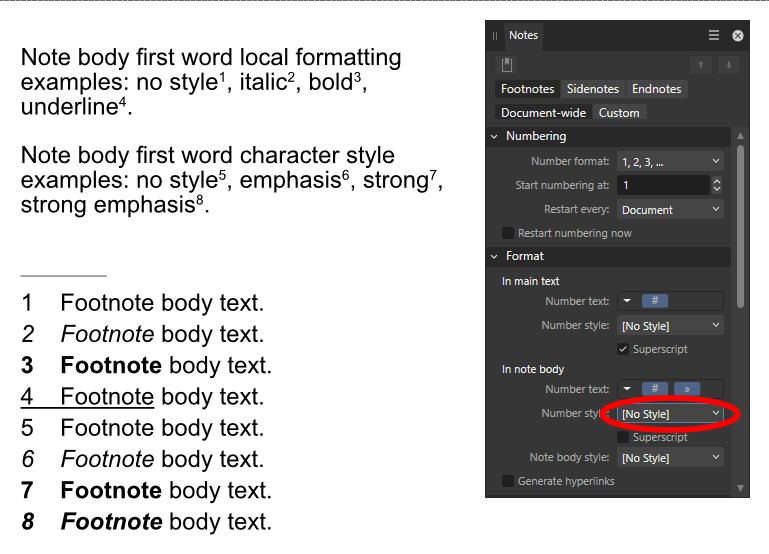
crdasneves
Members-
Posts
22 -
Joined
-
Last visited
-
 Alexandre_Noite reacted to a post in a topic:
Publisher v2 - GREP styles
Alexandre_Noite reacted to a post in a topic:
Publisher v2 - GREP styles
-
 Chris B reacted to a post in a topic:
Publisher 2.1.0.1732 Books panel – chapter status icon behavior
Chris B reacted to a post in a topic:
Publisher 2.1.0.1732 Books panel – chapter status icon behavior
-
 MikeTO reacted to a post in a topic:
Publisher 2.1.0.1732 Books panel – chapter status icon behavior
MikeTO reacted to a post in a topic:
Publisher 2.1.0.1732 Books panel – chapter status icon behavior
-
Thank you very much, Mike! In my particular case, in a chapter with lots of figures and captions I had to slightly modify the captions line spacing (no other chapters with captions). Instead of changing the style in the source chapter (that I really use to syncronize styles after importing each chapter) or local formatting each caption I've just modified the style itself. Then I opened the book and do the update status just to get rid of the notification and not confuse myself later. Only then I realized the line spacing was back to the previous state, wich caused a frame with overflow text, and a new notification, this time in the preflight. I've notice the "tiny little bug" also, and hope the Affinity Team doesn't consider it a bug at all, as I'm counting on this as a way to update the status and not be notified again 🙂
-
Hi Mike, Sorry, I didn't express myself well; it's not about updating the styles of the other chapters, but about updating the status of the book in relation to that chapter that was modified. I open the book and Publishers notifies me that there is an outdated chapter; well, if I already know that because I just made that modification, I would like to click on the icon just to confirm that yes, there was a modification and everything is alright. Note that if you make a different type of modification in the chapter other than styles (e.g local formatting), updating the status icon does not interfere with those modifications. In other words, I would like the style synchronization to occur only through the specific command.
-
Footnote number style in note body
crdasneves replied to crdasneves's topic in V2 Bugs found on Windows
Thank you, Bruce, I'll try it. I've found this issue importing a MS Word file; in one footnote the first word had a character style and the number got it. Yes, it shouldn't be like this. In the file I mentioned, I solved it by cleaning up the first word style, inserting a zero-width space before it and then reapplying the style to the word. Thank you all guys! -
Footnote number style in note body
crdasneves replied to crdasneves's topic in V2 Bugs found on Windows
Actually I've notice this in a text with styled footnote text, so I think it doesn't matter. Here's the test file from my firt post, now with a paragraph style. footnote_number_style.afpub -
Footnote number style in note body
crdasneves replied to crdasneves's topic in V2 Bugs found on Windows
Thank you, but I guess I didn't explain it well. In your note 2, for example, please try to apply italic to the word "Strong" and see if "2" remains the same, just bold, or it turns italic and bold. In other words: the number heirs the character style from the first word (or letter, or space) of the text. Here's what I get: -
Hi guys, Any local formatting or character style applied to the first word (or letter or space) in the note body text is also applied to the footnote number, even if it already has a character style. It's the same with endnotes and sidenotes (Windows 10, v. 2.0.3). Could you please try to replicate that? Best, Cleber
-
 David Cake reacted to a post in a topic:
Publisher v2 - GREP styles
David Cake reacted to a post in a topic:
Publisher v2 - GREP styles
-
Publisher v2 - GREP styles
crdasneves replied to michaelschutz's topic in Feedback for the Affinity V2 Suite of Products
I couldn't agree more. Finally, we have footnotes, but the lack of style mapping during text import, GREP styles, more robust nested styles, custom variables, and the possibility of saving find/replace searches keeps InDesign way ahead regarding (semi)automatic formatting. I'd love to see more text-oriented features in future updates. -
Footnotes/Endnotes
crdasneves replied to garrettm30's topic in Feedback for Affinity Publisher V1 on Desktop
Me too. I bought Publisher at launch, hoping the footnotes were a beta away... I'm still paying for InDesign (footnotes are essential in my work), but I love the Affinity suite and desperately want to say goodbye to Adobe. -
 Ramon56 reacted to a post in a topic:
Footnotes/Endnotes
Ramon56 reacted to a post in a topic:
Footnotes/Endnotes
-
 Ralph reacted to a post in a topic:
Footnotes/Endnotes
Ralph reacted to a post in a topic:
Footnotes/Endnotes
-
 cyberlizard reacted to a post in a topic:
Footnotes/Endnotes
cyberlizard reacted to a post in a topic:
Footnotes/Endnotes
-
Footnotes/Endnotes
crdasneves replied to garrettm30's topic in Feedback for Affinity Publisher V1 on Desktop
After 34 pages, the definitive description of the entire topic. 😉 -
Hi, In APub 1.8.5.703 (Windows 10) find and replace doesn't work properly when searching is done through the regex ".+" associated with any character format or style setting; in fact, each occurence is finded and listed, but it can't be replaced (it's not even selected in text) unless it's at the end of paragraph. When the regex is changed to "[a-z]+" or to "." OR the format is reset everything works fine (please see the file attached). I've found the same issue in beta 1.9.0.887. Is this a known bug? Am I missing something? Cheers, Cleber regex_test.afpub




